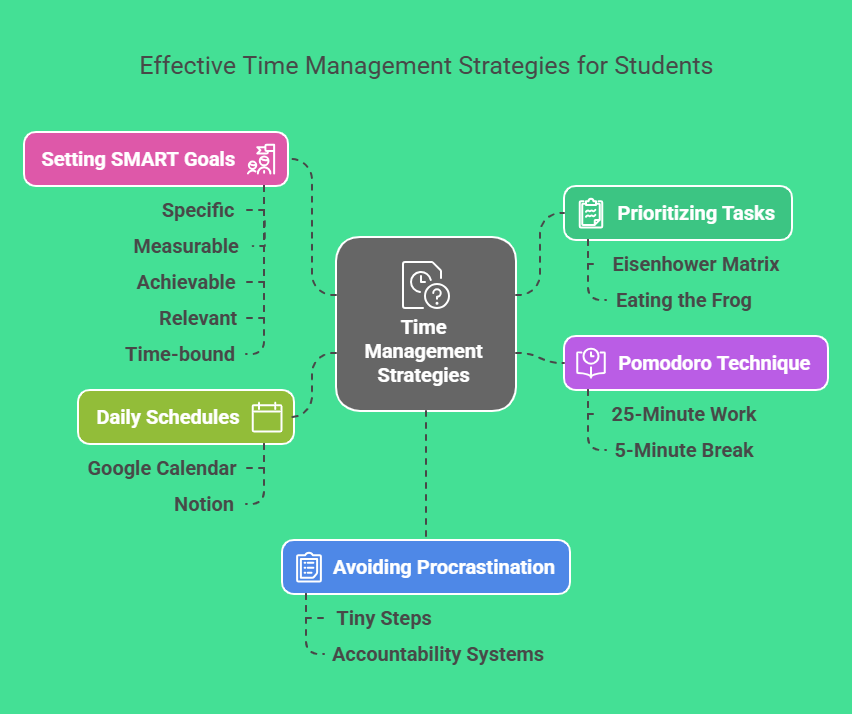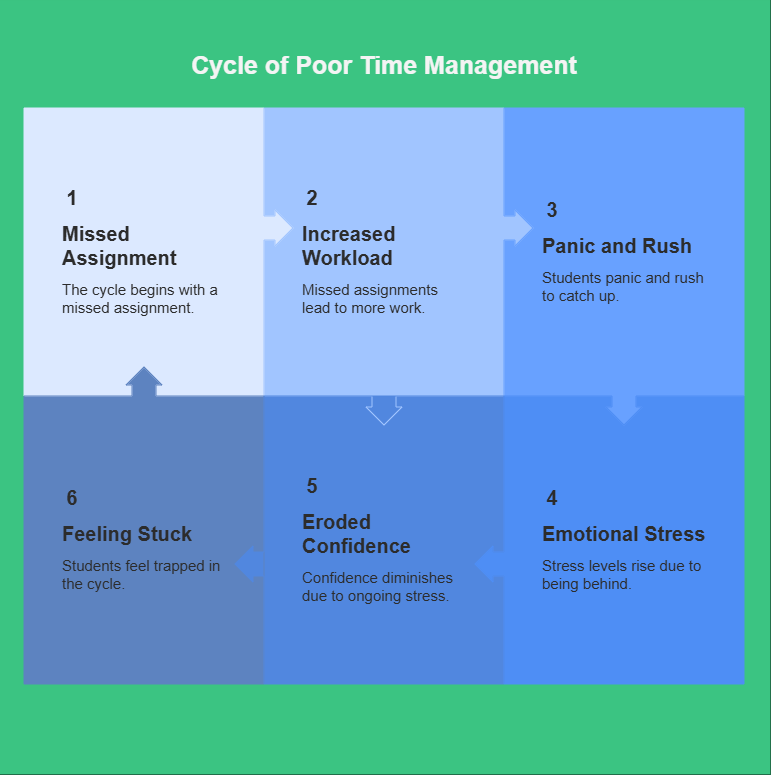If you’re a student, chances are you’ve had moments where 24 hours just didn’t seem like enough. You’ve probably crammed for a test at 2 a.m., pulled off last-minute assignments, or promised yourself “never again” after a sleepless night. Sound familiar? That’s where time management steps in—not as a boring productivity lecture, but as your secret weapon.
To give you an example, when I first started college, I thought I could just turn it around like in high school. Boy, was I wrong! Between trying to juggle classes, study groups, part-time jobs, and maintaining some semblance of a social life, I quickly realized that without proper time management, something had to give — and it was usually my grades or my sleep. That’s when I started asking myself: why is time management important for students like me who are trying to do it all?
The answer became clear—it creates structure in an otherwise chaotic student life. So, if you’ve ever struggled to keep up, you’re not alone. And in this article, we’re going to take an in-depth look at why time management is so important for students. Whether you’re a chronic time-waster or just looking to sharpen your skills, you’ve come to the right place.
What is Time Management?
Did you know that time management plays an important role in our daily lives when it comes to success? As simple as this issue may seem, it actually depends on strategic and conscious planning. If we can manage our time well, we’ll be one step ahead in achieving success. This applies not only to students but to everyone. That’s why we need to understand time management.
Defining the Concept Simply
Time management is like being the CEO of your own day. It’s the ability to plan, organize, and manage the time you dedicate to specific activities. It’s not just about doing more — it’s about doing what matters, efficiently.
Imagine your day as a jar, and your tasks as big rocks, small pebbles, and fine sand. Time management helps you fit in the big rocks (important tasks) before the sand (distractions) takes over.
Time Management vs. Productivity
Time management and productivity are cousins, not twins. Time management is all about how effectively you make use of your time. Productivity is about what you produce with that time. Good time management leads to higher productivity — but you can be busy without being effective.
It’s like running on a treadmill versus walking toward your destination. One keeps you moving, the other gets you somewhere.

Why Is Time Management Important for Students?
You know how important it is to manage time during student life. In fact, it raises the big question: why is time management important for students? It’s so important that if we can do it well, we achieve success — and if we can’t, we may end up failing. Student life isn’t just about books; it’s a roller coaster! Classes, assignments, presentations, a bit of socializing, the pressure to study again… sometimes it all feels like magic. But if you can use your time properly, you can create that magic yourself — in real life. So, let’s agree that it truly is important.
Academic Success and Less Stress
Let’s face it: school is demanding. Assignments, exams, group projects—it’s a lot. With solid time management, you avoid the mad scramble and get better results. You’ll start acing tests without pulling all-nighters. Sounds dreamy, right?
Students who know how to manage their time usually score higher and feel less stressed. It’s not magic—it’s a method.
Time Management and Mental Health
Poor time habits can lead to anxiety, burnout, and even depression. When your workload feels like a mountain and the clock is ticking, panic kicks in. Time management helps you break that mountain into hills, giving your brain space to breathe.
It’s self-care in disguise.
Balancing School and Life
Ever feel like school is taking over your whole life? Time management helps create space for hobbies, family, exercise, or just chill time. Because being a student shouldn’t mean being a machine.
A well-balanced schedule is the difference between surviving the semester and actually enjoying it.
5 Strategies for Effective Time Management for Students
Okay, you understand that time management is important. But here’s the real question — where do you begin? Just watching the clock won’t help. You need some strategies that actually work. Below are five strategies that will help you become more organized, calm, and successful in student life. Let’s dive into these five strategies.

1.Prioritizing Tasks Like a Pro
Not all tasks are created equal. Try using the Eisenhower Matrix, or just ask yourself: “What’s urgent and what’s important?” Prioritizing lets you zero in on what really matters—right when it matters the most.
Start your day with the hardest task. That’s called “eating the frog”—gross metaphor, but it works.
2.The Pomodoro Technique: Study Like a Timer Ninja
Work for 25 minutes, break for 5. That’s one Pomodoro. Do four rounds, then take a longer break. This approach helps you stay focused and prevents burnout from creeping in.
Set a timer. Stick to it. Watch your efficiency spike.
3.Planning Ahead with Daily Schedules
Daily planning is your anchor. Take 10 minutes each morning to map your day. It prevents decision fatigue and keeps you focused.
Google Calendar, Notion, or good old paper planners—whatever works, use it.
4.Avoiding the Procrastination Trap
We all scroll Instagram instead of writing that essay. Combat procrastination by breaking tasks into tiny steps and using accountability systems. Tell a friend. Use a timer. Trick your brain into starting.
Starting is half the battle.
5.Setting SMART Goals That Actually Work
SMART = Specific, Measurable, Achievable, Relevant, Time-bound. “Study more” is vague. “Review biology flashcards for 30 minutes at 6 p.m.” is a SMART goal.
Specificity adds clarity. Clarity fuels action.
Saving Time for Studying: The Three-Hour Rule
Saving time and reading more is great, isn’t it? But you need a system that truly works. The ‘Three-Hour Rule’ is one such simple yet powerful method that can make a big difference in your study habits. Have you heard of the ‘Three-Hour Rule’ before? If not, now’s the time to find out.
What Is the Three-Hour Rule?
The Three-Hour Rule is simple: for every hour of class, aim to study three hours outside it. That might sound intense, but it’s based on how much time it actually takes to master content deeply.
It’s about studying smarter, not harder.
How to Apply It to Your Study Routine
Break those three hours into smaller sessions. Use active recall and spaced repetition. Quiz yourself, teach the material, write summaries. Studying doesn’t mean just re-reading notes.
Make those hours count.
Common Mistakes and How to Avoid Them
Cramming the night before? That’s not the Three-Hour Rule—it’s survival mode. Also, avoid multitasking. You’re not really watching a lecture and scrolling TikTok.
Quality > quantity, always.
Best Time Management Tools for Students
Everyone says to save time—but no one explains how. Honestly, time management is a lot easier with the right tools. These days, there are apps and planners that can put your study routine on almost auto-pilot—you just have to get started.
Digital Tools (Apps & Extensions)
From Todoist and Trello to Notion and Forest, there’s a tool for every personality. Want gamification? Try Habitica. Need focus? Try Freedom or Cold Turkey Blocker.
There’s no excuse — tools are at your fingertips.
Old-School Planners vs Digital Calendars
Some students swear by physical planners. Others live in their Google Calendar. Both work — it depends on what makes you more likely to follow through.
Experiment. Mix and match. The best system is the one you actually use.
Choosing the Right Tool for Your Style
Visual learner? Try Kanban boards. Analytical thinker? Use lists and charts. The goal isn’t to impress your friends with aesthetics — it’s to make planning intuitive for you.
Productivity is personal.
How Poor Time Management Affects Students
Not managing your time doesn’t just increase your workload—it breaks down your entire system. It starts with one missed assignment, then leads to one problem after another. A slightly messy timeline can turn into a much bigger disaster—in the blink of an eye.

The Domino Effect of Missed Deadlines
One missed assignment snowballs. Then you’re behind, panicking, and rushing. It spirals quickly. Good time habits keep that first domino upright.
A little structure prevents a lot of chaos.
Emotional and Academic Consequences
Chronic lateness, lost marks, and constant stress? That’s what poor time management brings. It erodes confidence and leaves students feeling stuck.
Getting ahead of the clock puts you in control.
The Science of Time Perception in Teens
Brain Development and Time Awareness
The teen brain still growing—especially the part that handles planning and self-control. That’s why time can feel like a weird concept.
It’s not just you—it’s biology.
Why Students Underestimate Time
Ever think an assignment will take 20 minutes and it eats up two hours? That’s called the planning fallacy. Students regularly underestimate how long things take.
Tracking your time helps recalibrate your expectations.
Creating a Time-Conscious Lifestyle
Time management doesn’t just happen with a plan—it has to become part of your lifestyle. When you start using your time consciously, it turns into more than just task management—it becomes a habit. And this habit gradually transforms your student life.
Building Habits That Stick
Habits are easier than motivation. Build morning and evening routines that include planning and reviewing. Anchor new habits to existing ones — like reviewing flashcards after brushing your teeth.
Habit stacking = secret sauce.
Saying No to Time-Wasters
Your time is limited. Saying yes to everything means saying no to priorities. Learn to spot time-wasters — endless scrolling, unclear goals, multitasking.
Guard your time like a treasure chest.
Frequently Asked Questions (FAQs)
1.How can I stop procrastinating?
Break tasks into smaller steps, use timers, and eliminate distractions.
2.Is multitasking good for time management?
No. Multitasking reduces focus and leads to lower quality results.
3.How can I prioritize tasks effectively?
Use techniques like the Eisenhower Matrix to sort tasks by urgency and importance.
4.What’s the Pomodoro Technique?
It’s a time management method involving 25-minute work intervals followed by short breaks.
5.Can time management improve mental health?
Yes. It reduces anxiety and prevents burnout.
6.How does poor time management affect students?
It can lead to missed deadlines, lower grades, and increased stress.
7.Why do students underestimate how long tasks take?
Due to cognitive biases like the planning fallacy and a lack of tracking experience.
8.What are SMART goals?
Goals that are Specific, Measurable, Achievable, Relevant, and Time-bound.
9.Are digital planners better than paper ones?
It depends on personal preference. Use the one you’ll actually stick with.
10.How do habits affect time management?
Good habits create consistency and reduce decision fatigue.
11.Is it too late to improve my time management?
Never. You can start building better habits today with simple, actionable steps.
All in all of this article
So, why is time management important for students? Because it’s the superpower that turns chaos into control, stress into success, and busywork into meaningful progress. Time is the one resource you can’t get back—manage it wisely, and you’ll thrive in school and life.
Start small. Stay consistent. And remember: your future self will thank you.
Hello friends, I enjoyed writing this article. If you liked it, please share it on your social media so your classmates can read it and find solutions to their problems. Stay well, and may your student life be happy.

